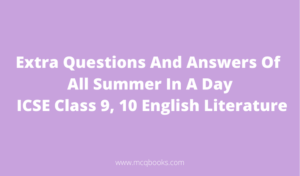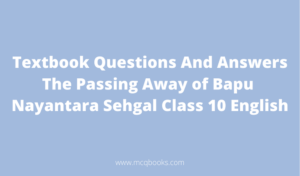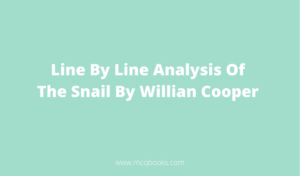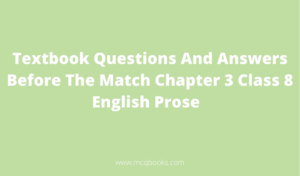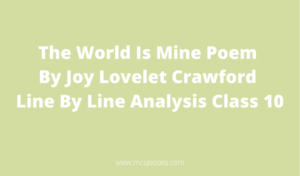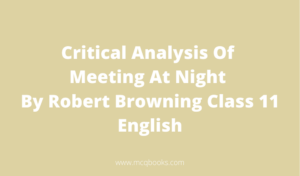Extra Questions And Answers Of Blue Bead Class 9, 10 ICSE English
English is a difficult subject for many people to learn. Some students may become frustrated and give up, but here’s Extra Questions And Answers Of Blue Bead Class 9,10 ICSE English to help you maintain your momentum! This Extra Questions And Answers Of Blue Bead will provide all necessary information needed in order to study ICSE Class 9, 10 English successfully at home or school; it includes detailed grammar rules with examples that were used during today’s class discussion on the ICSE Board English Exam.
The Extra Questions And Answers Of Blue Bead in English, ICSE Board Class 9, 10 makes it easier to understand the story. Understanding every detail of a story is important for scoring higher on an exam and expert writers have made sure that you know how everything flows together by summarizing perfectly!
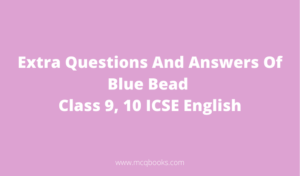
1. From where and why did the crocodile come? Why did the crocodile raise his eyes and nostrils out of water?
~ The crocodile had come from the deep black water of the river to glassy shallows of the river to rest.
The crocodile raised his eyes to get a clear sight of the area around the stepping stones and raised his nostrils the water to breathe easily, this enabled him to lay motionless and concealed, in ambush, for a prolonged duration.
2. How old was the crocodile? How did he survive?
~ The crocodile was a hundred years old. He was twice the size of a tall man.
As soon as the crocodile was hatched it was ready to snap at anything he sees or encounters for food and had survived with the help of his brainless craft and ferocity.
3. How big was the crocodile? What posed danger to him when he was young?
~ The crocodile was a hundred years old and was large. It was twice the size of a tall man.
When the crocodile was small it had faced many dangers. The birds of prey and the great carnivorous fishes that eat the baby crocodile posed a danger to him when he was small and young.
4. How can you say that the crocodile was dangerous?
~ The crocodile was very dangerous. It was described as “an antediluvian saurian, a prehistoric juggernaut, ferocious and formidable, a vast force in the water, propelled by the unimaginable and irresistible power of the huge tail”. It says that he was a strong and dangerous animal. He also attacked one of the Gujar women.
5. Describe the appearance of the crocodile.
~ The crocodile with a huge tail was twice the length of a tall man. He was a hundred years old. His colour was blackish-brown on above and yellowy white on underside with a throb in his throat and his mouth was closed and fixed in evil bony. His hide was one inch thick and nothing could pierce it. The crocodile used the power of his huge tail to move in the water.
6. Describe the physical appearance of the Sibia.
~ Sibia was a thin little girl poor girl with a coloured rag, white teeth with her ebony hairs and great eyes, and ber skin of oiled brown cream. She was a happy and immature girl of 12 years. She was barefooted on a cold winter morning and born to toil. In her life, she had never owned anything but a rag. She had not even owned one anna. She used to help her mother and work.
7. Describe her lifestyle. How can you say that she is poor?
~ Sibia worked to earn her livelihood since her childhood. She had husked corn, and gathered sticks, and put dunk to dry, and cooked and weeded, and carried, and fetched water, and cut grass from the hills.
The little girl was very poor. Her financial status was not good. She was dressed in a leather coloured rag. The girl divided the chapati into parts to make chapati seem more. She had never owned anything but a rag. She had divided the rag in two to make it a skirt and sari which shows that she was not having money even to buy clothes.
8. Character sketch of Sibia.
~The little girl the protagonist of the story is an example of a little girl’s adventures journey of shaping her simple dream of a necklace amid the heavy hardships of a poverty-stricken life. Besides being courageous Sibia was also caring about her household chores. Even when she was a toddler she husked corn and gathered sticks. All her work was her companion and her mother’s.
9. Who are the Gujars?
~ As said in the story ‘The blue bead’ Gujars were the people who were born and bred in the country for countless centuries. They earn their living from animals, grass, and trees as they scratched their food together. They stored their substance in large herds and possessed silver jewellery. They were the wanderers of the postal age.
10. Describe the role of the women in the village.
~ In the story ‘the blue bead’ we find that the village women were not restricted to look after the households. Sibia her mother and other residents were found going to the cliffs to get grass from the hills to sell them in the market. The Gujar graziers have also set up their encampment of grass huts near the river.
11. Describe the appearance of the Gujar women.
~ As mentioned in the story the Gujar women wore trousers, tight and wrinkled at the ankles, and In the ear, they would wear large silver rings, made out of melted rupees, and one of them was clinking a stick against the big brass hurrahs in which they fetched water from the river for the camp, to see which one were empty. They used to roll up their skirts to climb the hill to cut grasses.
12. Describe the image of the bazaar.
~ Sibia walked through the forest to the little town at the railhead, to the bazaar in that town. In the bazaar, she noticed milling people, dogs, and monkeys who were full of fleas. Some people were spitting betel juice. She also heard the bell of a sacred bull. There was a sweet honey stall with brilliant collections of honey. It was surrounded by dust and flies. Their smell was superior to those of the cheap cigarettes and drains. She also noticed a cloth stall with various varieties of clothes. It was stacked with varieties of cotton and silk. Other wonders of the bazaar include satin sewn with thread, tin trays of Birmingham, cream silk, and a box whose switch when pressed emerged out a chicken made of wool.
13. What was the Kashmiri merchant selling?
~ In the bazaar the Kashmiri merchant was selling dawn-coloured silks that poured ice cream, a little locked chest with turquoises and opals in it, and a box which when pressed tinkles out a bell and a yellow woollen chicken jumped out from the box.
14. What did Sibia see and hear while passing through the bazaar?
~ While Sibia was passing through the bazaar she saw the milling people, and dogs and monkeys full of fleas, the idling gossiping of the common people, the bargaining, humanity spitting betel juice, she heard the bell of a sacred bull clonking as he lumped along.
15. What was the woman doing? What did she carry?
~ The women of the village rolled their skirts up so that they could jump from stone to stone as they were climbing the hill to reach the grass so that they can cut it. This gave them easy to move.
They were carrying sickles and hay forks with them so that they can visit the grasses on the hill.
16. What were they doing in the hills?
~ The women of the village were not at all restricted. They were climbing the hill to reach the grass so that they can cut it with their sickle and then gather with their hay forks so that they could get it and sell it on the market.
17. Describe the necklace of the woman.
~ Every woman or the other fanaticized of the beautiful necklaces as Sibia did. The women were wearing necklaces made out of all-lal-beiges, the shiny scarlet seeds, black one end, that grew everywhere in the jungle. They wanted to wear several necklaces as they like to hear rattling swish around their neck same as Sibia.
18. What type of ornaments did Sibia wish to wear?
~ Sibia fantasized to wear ornaments that would make a rattling swish around her neck, as she rushed along with lots of necklaces. When she went to the bazaar she fancied the anklets, bangles and nose rings sold at the bazaar. However, her heart was set on colourful glass beads. She wished to wear a new necklace made from those beads.
19. What happened with the woman?
~When the Gujar woman walked onto the stepping stones, the dangerous crocodile on the water lunged at her and hold her leg. The woman screamed, dropped both brass pots with a clatter on the boulder. The Gujar woman recoiled from crocodile but at the same time, she fell on a bone-breaking stone. She clutched one of the timber logs to save herself but was helpless at that moment.
20. Describe how Sibia encounters the crocodile.
~ When Sibia saw the Gujar woman struggling to save herself from the crocodile, she immediately came to rescue her. Sibia could see the face of the crocodile in the water, fastened around her leg, and was tugging to and fro. His eyes rolled on his Sibia. Sibia knew that one slap of his tail could kill the woman. He eventually struck and the water shot up, the rock too jumped under the blow of his tail. She did not hesitate and decide to face him. Sibia ran over and stabbed the crocodile in the eyes with her hayfork which she used to cut the grass. The crocodile reared up in convulsion, disappearing into the water.
21. What happened to the crocodile in conclusion.
~ Sibia ran over and stabbed the crocodile in his eyes with her hayfork, the only weak part of that animal when she found the Gujar woman getting attacked by him. The crocodile reared up in convulsion, disappearing into the water. Sibia had saved the attacked woman from the clutches of the dangerous animal.
22. Why was Sibia overjoyed?
~ Sibia after saving the life of the woman was returning to her home. On her way home, she felt overjoyed, when she saw the blue bead lying on the ground next to her hayfork. It was perfect for her necklace, it was pierced and was ready for use. She was very happy as she always fantasized about such necklaces but she couldn’t afford them.
23. Why was Sibia’s mother worried? What did she tell her?
~ Sibia’s mother was very tensed for her as she had no idea where was the little girl, she was already late. Sibia found a blue bead that was perfect, pierced, and ready to use. Her heart went up in flames of joy. She returned home where her mother was worried about her safety as she was late. On enquiring the reason for being late, Sibia told her that she had found a blue bead for her necklace.
24. Describe the conflict between the human and nature.
~ The major conflict highlighted in the story ‘The Blue bead’ is the conflict between humans and nature. The Gujar woman was attacked by a crocodile, Sibia the brave and courageous little girl saved her life. It tells us how brave and courageous Sibia was and how she found her reward, the blue bead. Crocodiles often attack humans, it’s unlikely to get saved but luckily Sibia was there to save the Gujar woman. It says that besides being friendly nature can also be harmful and dangerous.
25. How can you say that the little girl Sibia was courageous?
~ Sibia had fantasies of stuff like coloured beads to sew various necklaces and bracelets. But her family could not afford to fulfil her wishes as they were really poor. They worked very hard to acquire the basic need of their lives. The only thing Sibia could do was fantasize about having her coloured beads. Despite being in such a poor state, she never gave up on qualities like bravery, courage, and humanity. When the Gujar woman gets attacked by a crocodile, Sibia uses her hayfork to stab the crocodile and save the life of the woman.
26. Comment on the ending of the story.
~ The ending was meticulous, it was the perfect happy ending. The last scene of the story is very touching Sibia gets the reward for her bravery. She exclaims to her mother that she has found a blue bead for her necklace, the only thing she used to fantasize about all day long. The battle that she fought with the crocodile to save the Gujar woman, the bravery, the humanity was the daily heroism, of the jungle life.
27. Describe the moral of the story.
~ The story ‘The Blue Bead’ is about a brave young and poor girl, Sibia, who has saved a Gujar woman’s life. It completely revolves around the moral that good things come through difficult situations like Sibia got what she used to fantasize about all day long as a reward. The proverb ‘where there is a will, there is a way is the very appropriate and relatable one.
28. Is the title of the story ‘The Blue Beed’ appropriate?
~ Yes, the title of the story is quite appropriate.
The title “The Blue Bead” is an effective one as it relates to Sibia and her point of view. It completely revolves around her life and her fantasy. She used to fantasize all day long about the beautiful necklaces as her family couldn’t afford them for her. But lastly, she was rewarded with the perfect pierced necklace which was ready for use, for her bravery.
Questions And Answers
What exactly was the blue bead in the story?
The Blue Bead’ is a story about a brave young girl, Sibia, who has saved a woman’s life. In the process of doing so, she acquires a blue bead, something she had been desiring for quite earnestly
Why are the gujars called Junglis?
They were called junglis because they were born and bred in the forest. For centuries they had been getting their living from animals and from grass trees. They scratched their food together and stored their substance in large herds and silver jewellery.
When was the blue bead written?
The short story “The blue bead” written by Norah Burke in 1953 is all about a twelve-year-old girl; her heroic deed and a simple, innocent wish.
Is blue Bead a true story?
The Blue Bead is a work of famous novelist and non-fiction writer, Norah Burke. It is a story depicting the heroic deed of a twelve-year-old girl named Sibia. She was a simple Indian girl living in poverty.
Why is sibia called a child woman?
Sibia is called a happy immature child-woman at the age of only twelve years just because of her appearance and the burden which she bore to help in household chores.
How long was the crocodile in blue bead?
The crocodile mentioned in the story is quite large. He is twice as large as a tall man scaling over twelve feet.
What did sibia find in the water?
Sibia saw a small blue bead lying by the river, she grabbed it.
What did sibia do when she saw the woman being attacked by the crocodile?
As the lady was attacked by the crocodile, Sibia saw it and jumped into the water with a stone in hand to save the lady. Sibia targeted the eyes of the crocodile and hammered the crocodile with the stone and drive it away leaving the lady.
Who is the antagonist in the blue bead?
Sibia had to face the crocodile who is the antagonist in the story and who is part of nature.
Is the title Blue Bead appropriate?
The title is appropriate because the blue bead is one of the unattainable wonders for her that she manages to attain at the end. She tells her mother that she has found a blue bead of her necklace.
